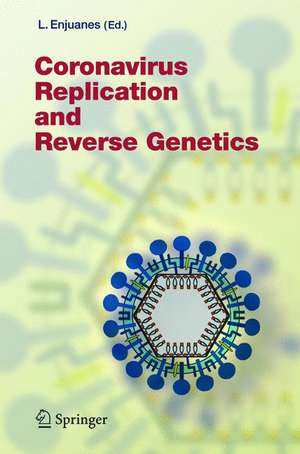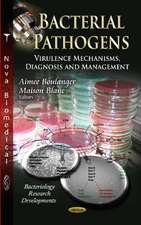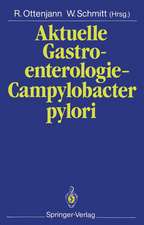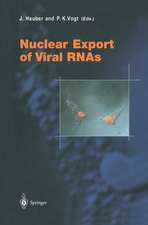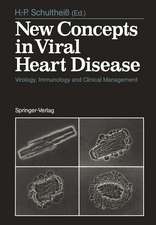Coronavirus Replication and Reverse Genetics: Current Topics in Microbiology and Immunology, cartea 287
Editat de Luis Enjuanesen Limba Engleză Hardback – 5 oct 2004
| Toate formatele și edițiile | Preț | Express |
|---|---|---|
| Paperback (1) | 943.43 lei 6-8 săpt. | +220.19 lei 7-13 zile |
| Springer Berlin, Heidelberg – 19 oct 2010 | 943.43 lei 6-8 săpt. | +220.19 lei 7-13 zile |
| Hardback (1) | 949.55 lei 6-8 săpt. | |
| Springer Berlin, Heidelberg – 5 oct 2004 | 949.55 lei 6-8 săpt. |
Din seria Current Topics in Microbiology and Immunology
- 18%
 Preț: 962.03 lei
Preț: 962.03 lei - 5%
 Preț: 1123.13 lei
Preț: 1123.13 lei - 5%
 Preț: 1085.92 lei
Preț: 1085.92 lei -
 Preț: 499.76 lei
Preț: 499.76 lei - 5%
 Preț: 967.79 lei
Preț: 967.79 lei - 18%
 Preț: 1118.62 lei
Preț: 1118.62 lei - 5%
 Preț: 717.00 lei
Preț: 717.00 lei - 5%
 Preț: 712.97 lei
Preț: 712.97 lei - 5%
 Preț: 709.51 lei
Preț: 709.51 lei - 5%
 Preț: 709.51 lei
Preț: 709.51 lei - 5%
 Preț: 721.19 lei
Preț: 721.19 lei - 5%
 Preț: 359.78 lei
Preț: 359.78 lei - 5%
 Preț: 711.88 lei
Preț: 711.88 lei - 5%
 Preț: 774.81 lei
Preț: 774.81 lei - 15%
 Preț: 640.06 lei
Preț: 640.06 lei - 5%
 Preț: 717.00 lei
Preț: 717.00 lei - 5%
 Preț: 360.34 lei
Preț: 360.34 lei - 5%
 Preț: 707.69 lei
Preț: 707.69 lei - 5%
 Preț: 717.56 lei
Preț: 717.56 lei - 5%
 Preț: 716.28 lei
Preț: 716.28 lei - 5%
 Preț: 717.20 lei
Preț: 717.20 lei - 5%
 Preț: 711.32 lei
Preț: 711.32 lei - 5%
 Preț: 711.88 lei
Preț: 711.88 lei - 5%
 Preț: 718.29 lei
Preț: 718.29 lei - 5%
 Preț: 709.51 lei
Preț: 709.51 lei - 5%
 Preț: 369.84 lei
Preț: 369.84 lei - 5%
 Preț: 712.25 lei
Preț: 712.25 lei - 5%
 Preț: 716.45 lei
Preț: 716.45 lei - 5%
 Preț: 706.60 lei
Preț: 706.60 lei - 5%
 Preț: 711.52 lei
Preț: 711.52 lei - 5%
 Preț: 713.54 lei
Preț: 713.54 lei - 5%
 Preț: 720.47 lei
Preț: 720.47 lei - 5%
 Preț: 725.42 lei
Preț: 725.42 lei - 5%
 Preț: 708.06 lei
Preț: 708.06 lei - 5%
 Preț: 713.70 lei
Preț: 713.70 lei - 5%
 Preț: 705.83 lei
Preț: 705.83 lei - 5%
 Preț: 710.96 lei
Preț: 710.96 lei - 5%
 Preț: 723.93 lei
Preț: 723.93 lei - 5%
 Preț: 707.69 lei
Preț: 707.69 lei - 5%
 Preț: 715.35 lei
Preț: 715.35 lei - 5%
 Preț: 709.87 lei
Preț: 709.87 lei - 5%
 Preț: 359.05 lei
Preț: 359.05 lei - 5%
 Preț: 374.20 lei
Preț: 374.20 lei - 15%
 Preț: 635.31 lei
Preț: 635.31 lei - 5%
 Preț: 707.86 lei
Preț: 707.86 lei - 5%
 Preț: 721.96 lei
Preț: 721.96 lei - 15%
 Preț: 632.88 lei
Preț: 632.88 lei - 15%
 Preț: 632.05 lei
Preț: 632.05 lei - 15%
 Preț: 642.83 lei
Preț: 642.83 lei
Preț: 949.55 lei
Preț vechi: 1157.98 lei
-18% Nou
Puncte Express: 1424
Preț estimativ în valută:
181.69€ • 190.21$ • 150.34£
181.69€ • 190.21$ • 150.34£
Carte tipărită la comandă
Livrare economică 05-19 aprilie
Preluare comenzi: 021 569.72.76
Specificații
ISBN-13: 9783540214946
ISBN-10: 3540214941
Pagini: 276
Ilustrații: XI, 257 p. 49 illus., 18 illus. in color.
Dimensiuni: 155 x 235 x 23 mm
Greutate: 0.56 kg
Ediția:2005
Editura: Springer Berlin, Heidelberg
Colecția Springer
Seria Current Topics in Microbiology and Immunology
Locul publicării:Berlin, Heidelberg, Germany
ISBN-10: 3540214941
Pagini: 276
Ilustrații: XI, 257 p. 49 illus., 18 illus. in color.
Dimensiuni: 155 x 235 x 23 mm
Greutate: 0.56 kg
Ediția:2005
Editura: Springer Berlin, Heidelberg
Colecția Springer
Seria Current Topics in Microbiology and Immunology
Locul publicării:Berlin, Heidelberg, Germany
Public țintă
ResearchCuprins
Coronavirus Genome Structure and Replication.- Coronavirus Transcription: A Perspective.- The Coronavirus Replicase.- Viral and Cellular Proteins Involved in Coronavirus Replication.- Coronavirus Reverse Genetics by Targeted RNA Recombination.- Coronavirus Reverse Genetics and Development of Vectors for Gene Expression.- Reverse Genetics of Coronaviruses Using Vaccinia Virus Vectors.- Development of Mouse Hepatitis Virus and SARS-CoV Infectious cDNA Constructs.
Textul de pe ultima copertă
Coronaviruses are the RNA viruses with the largest genome known to date (27 to 32 kb). Members of this virus family affect most domestic animal species, causing important socio-economical losses, and also infect humans. Human coronaviruses were known to cause the winter common cold, a mild infection without important pathological consequences except in immuno-compromised patients. Recently, two new human coronaviruses have emerged, one causing the Severe and Acute Respiratory Syndrome (SARS) that infected more than 8000 individuals, leading to more than 800 deaths in 32 countries. This epidemic mobilized the World Health Organization, which launched travel restrictions to certain parts of the world for the first time in the last 50 years. The fact that coronaviruses, as many other viruses, crossed the species barrier to infect humans has posed a serious challenge to scientists involved in animal and human health. Control of coronavirus-induced diseases can only be the consequence of research on virus molecular biology and pathogenesis. This book contains information on virus genome structure, mechanism of replication and transcription, and the development of tools that make possible reverse genetic studies to understand virus-host interactions and the molecular basis of virus pathogenesis. The book also provides essential information for the development of classical and recombinant vaccines to control coronavirus infections.
